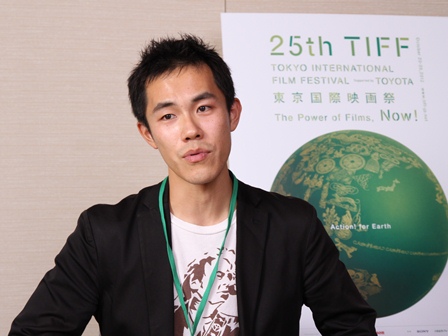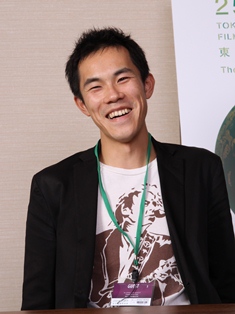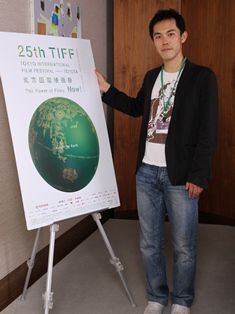Interview with Director Hiroki Iwabuchi (Chasing Santa Claus)

Hiroki Iwabuchi visited his hometown, Sendai, at Christmastime, following the earthquake and tsunami of 3.11.11. “Chasing Santa Claus” is his personal report of how the town is recovering from the tragedy that deeply affected them.
— Where did you start from? Where do come from in making documentaries?
Hiroki Iwabuchi: I made films during my university days. I didn’t belong to any kind of group of people who were working in that field so I was on my own and self-documentary films seemed the easiest to create with my own camera, depicting what was happening in my own life. In addition, I went to a university in Yamagata, which is well know for the Yamagata International Documentary Film Festival, so I had many opportunities to watch documentary films and I found out how interesting they were.
— Do you see yourself and filmmakers like Matsue Tetsuaki at a new forefront of documentary filmmaking in Japan?
Iwabuchi: No, I don’t perceive myself at being at a new forefront of documentary filmmaking, actually. There are many types of documentary films, some reveal what’s hidden and by taking lots of interviews. I myself like to make films by showing what’s happening around me.
— Personal documentaries. Let’s talk about “Chasing Santa Claus.” You grew up in Sendai?
Iwabuchi: Yes.
— In the one scene, there’s your great aunt who’s a Christian.
Iwabuchi: Yes, she’s my great aunt.
— That’s what I thought. And so, did you grow up with Christianity in your home?
Iwabuchi: I didn’t grow up in a Christian family. Only she was Christian.
— But you believed in Santa until you were 22 years old.
Iwabuchi: Well, rather than saying I believed in him, I would say I kept receiving presents until I was 22. But I actually believed in Santa Clause until I was 17!
— In Sendai… I realize Christmas culture has been in Japan for a while, but it’s kind of an odd mix because Japan is largely Buddhist and Shinto. How do you reconcile these different ideas and how you approach them?
Iwabuchi: It’s often said that the Japanese way of celebrating Christmas is way too commercialized. In Christian belief there are actually no presents from Santa Claus. I understand that and I also heard about it on the film site. However, receiving presents at Christmastime makes kids so happy. I remember that, myself. So, I would like to welcome that aspect of Christmas.
— Do you think this is an important tradition for Sendai to continue?
Iwabuchi: Rather than the celebration of Christmas, what I found important at this time for Sendai, was the celebration of light – the lighting up of the trees along this major street. And when I interviewed the organizers of that celebration I was told by them how they would like to help Sendai to pass over that year, 2011 into the New Year. And especially, given the fact that the number of people living in temporary housing committing suicide was increasing. Given a situation like that, they felt to restore some kind of normalcy would be important and I felt very much in agreement with that kind of sentiment. I heard a statement somewhere that until the nuclear issue is resolved, the year 2011 would never be over. However, for those people, organizing the celebration of light, they wanted to help those people to turn a new leaf into the New Year by having that yearly event happen.
— There are musicians and music in the film. Could you tell me a little about them? For example, Yumbo and the other music you have in the film.
Iwabuchi: The band Yumbo played their music on March 20 of last year where they were evacuated. It was at a cafe – together with a used bookstore. They put their show on youtube and I watched it and I could really feel how anxious the people in Sendai must have been feeling at that time. But apart from all of that, I found the music, that song, astounding – and I felt regardless of any connections to the earthquake, what’s good is good. I felt very much encouraged by that and that’s why I used it.
— Did you know of Yumbo before? From when you lived in Sendai? Is the group well-known up there?
Iwabuchi: Yes, I’ve liked their music for a long time now, although they aren’t well known in Sendai.
— But they are Sendai-based?
Iwabuchi: Yes.
— Music, and I think you bring this up in the film, has a healing power. And in your film, there’s not just Yumbo, but there’s the marching bands, there’s the church music, there’s other music. Could you comment on that, please?
Iwabuchi: I don’t play music myself, but I like music. That’s a bit of an embarrassing statement. But I often feel inspired by music… or stimulated by music. I felt that way about the brass band in the film. I thought their music was very cool and had a lot of power. That’s why I used that music.

— This film is a very personal documentary. It has your family in it, your mother, many people who are close to you. I would like you tell me a little about this personal project in relation to your bigger and larger ideas about documentary filmmaking and your being an artist as a documentarian.
Iwabuchi: I shot my family and people close to me because I found them interesting. If I may make what sounds like an arrogant comment, I only shoot people who are interesting. And out of the footage that I find interesting I condense it through editing. Rather than artistic elements or the imagination a director may have, I would say my way of making films is to put together what I find interesting. Through that process, things that match my feelings start to emerge. And that’s how I make films. Does that make sense to you?
— Makes sense. Yes. Have you shown this film to your family and friends and/or the people in Sendai? And what’s been the reaction?
Iwabuchi: Well, their reactions varied. Each person had a different feeling about it. Some thought the film was about Christmas. Some thought it was about the earthquake and tsunami. It’s because the definitions of what Christmas is and what the different meant are different. It’s different according to each person. One thing is clear though, to people in Sendai, the pageant of light is a yearly event and it’s something they were used to and they watched every year. But, seeing it in this film, they felt last year’s celebration was somewhat different and they became of aware of that.
— And are your family and your mother doing OK now?
Iwabuchi: Yes, they’re doing fine, thank you. My mother came to watch the film screening today. She told me that watching herself on the screen, being so overjoyed at the news of getting a job, almost made her cry.
— I know that after the disaster of 3.11, Japanese filmmakers are beginning to document the events, their experiences, their reactions to what happened. Some films are critical of the government. Others talk about the “ganbaremasu” attitude – let’s get together and work toward recovery. Others are more reflective. How do you think your film fits into this big picture of all these Japanese filmmakers looking back at the affects of 3.11?
Iwabuchi: There are a variety of documentary films out there. I saw some of the ones that were created right after the disaster. They didn’t impress me at all. I particularly dislike the kind of documentary that doesn’t touch upon the bewilderment of the filmmaker, him or herself, but only having people speak on camera. I didn’t want to make a film like that. I liked the TV documentaries on NHK about the disaster, probably because they had such a limited time in which to create programs, and they skillfully came up with what they could within the time they had. I quite like them. This film is not about the disaster that struck the coastal area at all. Rather, it talks about the effect it had on the city of Sendai, which is inland. One thing disgusted and fed up with were the scenes of rubble shot from moving vehicles. I just couldn’t stand that imagery anymore. Whenever I saw that kind of footage used in films I felt really angry. I felt these filmmakers aren’t aware of anything. I really wanted to show how the people living in the city were affected by the disaster. Therefore, I suppose you could say, this a documentary about Sendai itself.

(Interview by Nicholas Vroman)



















